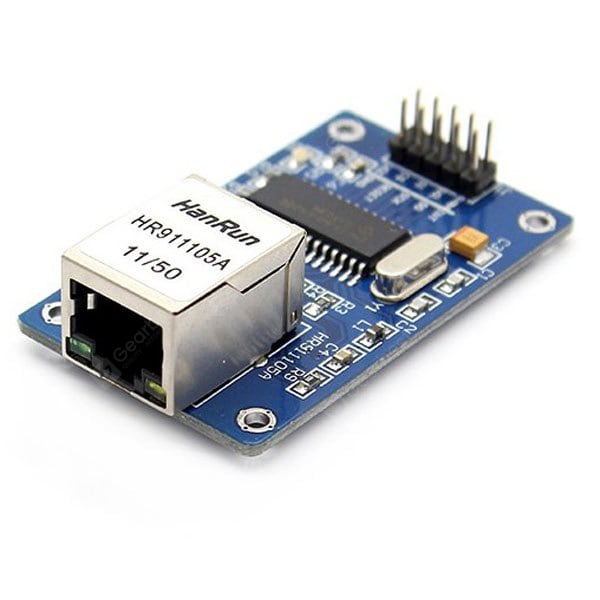Mbed library for ENC28J60 Ethernet modules. Full support for TCP/IP and UDP Server, Client and HTTP server (webserver). DHCP and DNS is included.
Dependents: mBuino_ENC28_MQTT Nucleo_Web_ENC28J60 Nucleo_Web_ENC28J60_ADC Serial_over_Ethernet ... more
Library for ENC28J60 Ethernet modules.

Ported to mbed from Norbert Truchsess's UIPEthernet library for Arduino. Thank you Norbert!
- Full support for persistent (streaming) TCP/IP and UDP connections Client and Server each, ARP, ICMP, DHCP and DNS.
- Works with both Mbed OS 2 and Mbed OS 5.
Usage:
- Import the library into your project.
- Add
#include "UipEthernet.h"tomain.cpp - Create one instance of the UipEthernet class initialized with the MAC address you'd like to use and SPI pins of the connected Mbed board.
Example programs:
Import programWebSwitch_ENC28J60
HTTP Server serving a simple webpage which enables to remotely turn a digital output on/off. Compile, download, run and type 'IP_address/secret/' (don't forget the last '/') into your web browser and hit ENTER.
Import programHTTPServer_Echo_ENC28J60
A simple HTTP server echoing received requests. Ethernet connection is over an ENC28J60 board. Usage: Type the server's IP address into you web browser and hit <ENTER>.
Import programTcpServer_ENC28J60
Simple TCP/IP Server using the UIPEthernet library for ENC28J60 Ethernet boards.
Import programTcpClient_ENC28J60
Simple TCP/IP Client using the UIPEthernet library for ENC28J60 Ethernet boards.
Import programUdpServer_ENC28J60
Simple UDP Server using the UIPEthernet library for ENC28J60 Ethernet boards.
Import programUdpClient_ENC28J60
Simple UDP Client using the UIPEthernet library for ENC28J60 Ethernet boards.
Import programMQTT_Hello_ENC28J60
MQTT Client example program. Ethernet connection is via an ENC28J60 module.
Diff: UipEthernet.h
- Revision:
- 15:53715cc81c63
- Parent:
- 14:7648334eb41b
- Child:
- 16:269f652b4d0b
--- a/UipEthernet.h Tue Sep 03 09:16:55 2019 +0000
+++ b/UipEthernet.h Sat Sep 07 17:42:42 2019 +0000
@@ -39,26 +39,6 @@
#include "utility/uip.h"
#include "utility/util.h"
}
-#define UIPETHERNET_FREEPACKET 1
-#define UIPETHERNET_SENDPACKET 2
-
-#define uip_ip_addr(addr, ip) \
- do { \
- ((u16_t *) (addr))[0] = (((ip[1]) << 8) | (ip[0])); \
- ((u16_t *) (addr))[1] = (((ip[3]) << 8) | (ip[2])); \
- } while (0)
-#define ip_addr_uip(a) IpAddress(a[0] & 0xFF, a[0] >> 8, a[1] & 0xFF, a[1] >> 8) //TODO this is not IPV6 capable
-
-#define uip_seteth_addr(eaddr) \
- do { \
- uip_ethaddr.addr[0] = eaddr[0]; \
- uip_ethaddr.addr[1] = eaddr[1]; \
- uip_ethaddr.addr[2] = eaddr[2]; \
- uip_ethaddr.addr[3] = eaddr[3]; \
- uip_ethaddr.addr[4] = eaddr[4]; \
- uip_ethaddr.addr[5] = eaddr[5]; \
- } while (0)
-#define BUF ((struct uip_tcpip_hdr*) &uip_buf[UIP_LLH_LEN])
class UipEthernet
{
@@ -69,7 +49,7 @@
UipEthernet (const uint8_t mac[6], PinName mosi, PinName miso, PinName sck, PinName cs);
- int connect();
+ int connect(unsigned long timeout = 60);
void disconnect();
void set_network(uint8_t octet1, uint8_t octet2, uint8_t octet3, uint8_t octet4);
void set_network(IpAddress ip);
